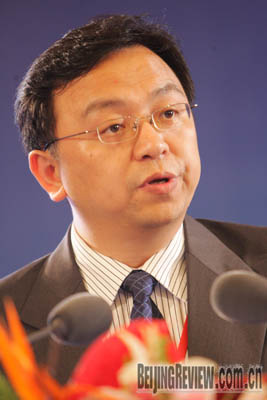|
But Buffett has been focusing on "finding an outstanding company at a sensible price" rather than generic companies at a bargain price, because future distributions are only based on assumptions. He has stressed the long-term profitability of target companies.
 AMBITIOUS OR AUDACIOUS? BYD president Wang Chuanfu claims his company will be the world's No.1 automaker by 2025
AMBITIOUS OR AUDACIOUS? BYD president Wang Chuanfu claims his company will be the world's No.1 automaker by 2025
Apart from the requirements related to "intrinsic value," a solid management team and good returns for shareholders, Buffett's other criteria for investment picks include companies that must have at least $5 million in after-tax earnings and have demonstrated consistent earning power. Zhou Jun, a company analyst at Investor Journal affiliated with the Economic Observer, said BYD basically meets all these requirements.
BYD reaped a net profit of 1.6 billion yuan ($235.3 million) last year, up 44.2 percent year on year. In the first half of this year, the company's net profit was 596 million yuan ($87.6 million), which ranked BYD among the top 30 of all 207 Hong Kong-listed industrial companies in terms of after-tax earnings.
In terms of consistent earning power, Buffet requires a company to have a sustainable competitive advantage, what he calls an "economic moat" that protects the company's profitability from competitors. BYD's moat, according to Zhou, lies in the company's leading technological advantages in rechargeable batteries and electric cars. This moat has enabled BYD to maintain a gross profit-to-sales ratio of more than 20 percent in the past five years, he said.
BYD's moat
Analysts believe BYD's most attractive asset for Buffett is the development of green automotive technologies, including lithium-ion batteries and a related line of hybrid and all-electric vehicles.
Wang Chuanfu, President of BYD, said that electric vehicles would allow people to be less reliant on petrol-energy and reduce greenhouse gas emissions and air pollution.
At the press conference, Sokol called BYD's technologies "a game changer" to seriously reduce emissions of carbon dioxide and address problems related to global warming in the future.
BYD has risen from obscurity in a few short years to be one of the world's largest makers of rechargeable batteries for cellphones and other uses, with Nokia Corp., Motorola Inc. and Samsung Electronics Co. among its customers.
The battery maker acquired 77 percent of Shaanxi Qinchuan Auto Co. in 2003 in a controversial move to make fuel-efficient compact and subcompact cars for the Chinese market. The fast-growing auto-making unit currently accounts for nearly a third of BYD's revenue. Backed by its technological advantages in rechargeable batteries, the auto dark horse is now marrying its battery technology with plug-in hybrids that can also run on petrol as a back-up fuel and all-electric cars.
MidAmerican, an electricity and natural gas provider in the midwest and west United States, sees plug-in electric cars as the best alternative to fuel-powered engines, because the country already has the infrastructure to supply electricity for recharging vehicles almost anywhere.
Sokol said that MidAmerican was impressed with BYD's ability to produce electric cars that have a range of almost 190 miles on a single charge and can be 80 percent recharged in 15 minutes. By comparison, General Motors Corp.'s electric-powered vehicle, the Chevrolet Volt, has a battery range of just 40 miles on a full charge.
BYD plans to start selling F3DM hybrids in China at the end of this year. It says the batteries for the car will last 10 years or 2,000 charging cycles.
Buffett's $230 million investment gives BYD capital and credibility to pursue its ambition of making environmentally friendly hybrid cars and becoming the world's No.1 automaker by 2025. Wang said at the press conference that BYD would sell cars in the United States and might even move up its plans for entering the market in 2010, by using Berkshire Hathaway's money to accelerate research.
In a new move to integrate the upstream supply chain for its electric cars, BYD acquired SinoMOS Semiconductor (Ningbo) Inc. for about 200 million yuan ($29.4 million) on October 6.
| 